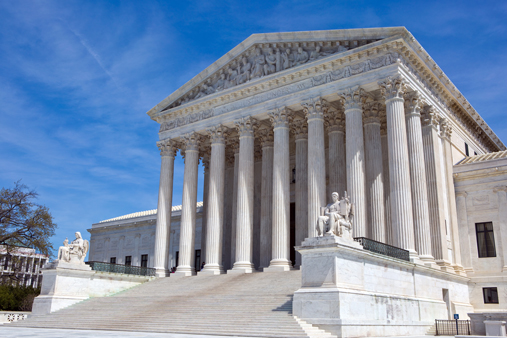On Tuesday, April 22, 2014, the U.S. Supreme Court issued an opinion that upholds a Michigan law prohibiting the use of race as a factor in admissions to public colleges and universities. In Schuette v. BAMN, Case No. 12-682 (argued Oct. 15, 2013) the high court reversed a Sixth Circuit Court of Appeals ruling that overturned the voter-enacted state constitutional amendment referred to as “Proposal 2” or Article I Section 26. Although the court’s 6-2 opinion stated “this case is not about the constitutionality, or the merits, of race-conscious admissions policies in higher education,” the decision is likely to influence other states to adopt similar constitutional bans on affirmative action in state-funded higher education.
Since 2003, Michigan has provided a venue for legal challenges to affirmative action programs in education. In that year, the U.S. Supreme Court reviewed the constitutionality of race-based admission policies of both the University of Michigan’s undergraduate college and its graduate law school. The outcomes of these cases were mixed. In Gratz v. Bollinger, 539 U.S. 234 (2003) the court struck down the undergraduate admission policy as a violation of the Equal Protection Clause of the U.S. Constitution’s 14th Amendment. In contrast, the court ruled in Grutter v. Bollinger, 539 U.S. 306 (2003) that the school’s more limited admissions policy for its law school was constitutionally permissible. Following those decisions, a number of states, including Texas, California, Oklahoma, Florida and Washington, have adopted constitutional amendments or other laws that prohibit affirmative action in school admissions and public employment.
In 2006, Michigan voters approved the following amendment to the state constitution by a margin of 58-42 percent: “The University of Michigan, Michigan State University, Wayne State University, and any other public college or university, community college, or school district shall not discriminate against, or grant preferential treatment to, any individual or group on the basis of race, sex, color, ethnicity, or national origin in the operation of public employment, public education, or public contracting.” In a 8-7 decision issued in November 2012, the 6th Circuit Court of Appeals held this language as unconstitutional because Proposal 2 placed “special burdens on minority interests” by targeting a program that “inures primarily to the benefit of the minority.”
In Justice Kennedy’s opinion, joined by Chief Justice Roberts and Justice Alito, the court considered whether authority existed to overturn a constitutional amendment adopted by a state’s ballot initiative. In order to do so, and based on the appellate court’s strong reliance on Washington v. Seattle School Dist. No. 1, 458 U.S. 457 (1982) the court would be able to overturn a ballot initiative that made it “more difficult for certain racial minorities than for other groups” to “achieve legislation that is in their interest.” This expansive reading, Justice Kennedy reasoned, could not conform to principles of equal protection because courts should not be required to declare which political policies serve the interests of a group defined in racial terms. Justice Kennedy cautioned: “…in a society in which those [racial] lines are becoming more blurred, the attempt to define race-based categories also raises serious questions of its own. Government action that classifies individuals on the basis of race is inherently suspect and carries the danger of perpetuating the very racial divisions the polity seeks to transcend.”
This significant decision upholds states’ rights to enact constitutional amendments by voter ballot initiatives. The broader implications of the Schuette decision are unclear. However, the outcome confirms public universities and government employers have a vested and ongoing interest in the changing shape of affirmative action policies.
For more information, please contact the Barnes & Thornburg Labor and Employment attorney with whom you work, or a leader of the firm’s Labor and Employment Department in the following offices:
Kenneth J. Yerkes
Department Chair
(317) 231-7513
John T.L. Koenig
Atlanta
(404) 264-4018
David B. Ritter
Chicago
(312) 214-4862
William A. Nolan
Columbus
(614) 628-1401
Eric H.J. Stahlhut
Elkhart
(574) 296-2524
Mark S. Kittaka
Fort Wayne
(260) 425-4616
Robert W. Sikkel
Grand Rapids
616-742-3978
Peter A. Morse
Indianapolis
(317) 231-7794
Scott J. Witlin
Los Angeles
(310) 284-3777
Teresa L. Jakubowski
Washington, D.C.
(202) 371-6366
Janilyn Brouwer Daub
South Bend
(574) 237-1139
© 2014 Barnes & Thornburg LLP. All Rights Reserved. This page, and all information on it, is proprietary and the property of Barnes & Thornburg LLP. It may not be reproduced, in any form, without the express written consent of Barnes & Thornburg LLP.
This Barnes & Thornburg LLP publication should not be construed as legal advice or legal opinion on any specific facts or circumstances. The contents are intended for general informational purposes only, and you are urged to consult your own lawyer on any specific legal questions you may have concerning your situation.


















/Passle/6488d4630e7e25c9ac9f834a/MediaLibrary/Images/2024-07-18-19-15-33-047-669969d52008239f764a11af.png)


/Passle/6488d4630e7e25c9ac9f834a/SearchServiceImages/2024-07-17-15-17-44-967-6697e0980752df56d2441ada.jpg)
